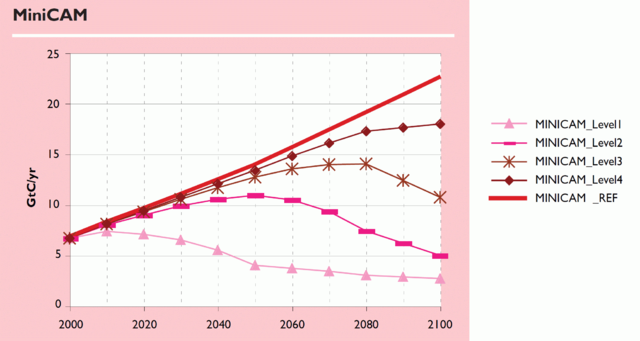 |
This is a file from the Wikimedia Commons. Information from its description page there is shown below.
Commons is a freely licensed media file repository. You can help.
|
Summary
| Description |
English: This graph shows projected emissions of carbon dioxide produced from fossil and other industrial sources between 2000-2100. The projections are based on emissions scenarios described in Clarke et al. (2007, p.20). The emissions scenarios shown were produced using the MiniCAM model of the Joint Global Change Research Institute, which is a partnership between the Pacific Northwest National Laboratory (USA) and the University of Maryland (USA) (Clarke et al., 2007, p.8). The red line plotted on the graph shows emissions in a "reference" scenario. In the reference scenario, it is assumed that no future efforts are made to limit greenhouse gas (GHG) emissions (Clarke et al., 2007, p.8). The other four lines plotted show emissions in "stabilization" scenarios. In the stabilization scenarios, GHG emissions are limited so as to stabilize the radiative forcing (i.e., the warming effect) of GHGs on the Earth's climate system. In the "MiniCAM Level 1" stabilization scenario, the radiative forcing of GHGs is stabilized at 3.4 watts per square metre (W/m2), relative to the pre-industrial forcing (Clarke et al., 2007, p.9). Non-CO2 gases contribute approximately 0.8 W/m2 to this, while CO2 contributes approximately 2.6 W/m2. The corresponding atmospheric CO2 concentration is 450 parts-per-million by volume (ppmv). For the other stabilization scenarios (levels 2, 3, and 4), total GHG radiative forcing is 4.7, 5.8, and 6.7 W/m2 respectively; with approximately 1.0, 1.3 and 1.4 W/m2 from non-CO2 gases; approximately 3.7, 4.5, and 5.3 W/m2 from CO2; with corresponding CO2 concentrations of 550, 650 and 750 ppmv, respectively. References: Clarke, L., et al., 2007: Scenarios of Greenhouse Gas Emissions and Atmospheric Concentrations. Sub-report 2.1A of Synthesis and Assessment Product 2.1 by the U.S. Climate Change Science Program and the Subcommittee on Global Change Research. Department of Energy, Office of Biological & Environmental Research, Washington, DC., USA.
|
| Date |
1 July 2007 |
| Source |
Clarke, L., et al., 2007: Scenarios of Greenhouse Gas Emissions and Atmospheric Concentrations, p.20. Sub-report 2.1A of Synthesis and Assessment Product 2.1 by the U.S. Climate Change Science Program and the Subcommittee on Global Change Research. Department of Energy, Office of Biological & Environmental Research, Washington, DC., USA. |
| Author |
Clarke, L., J. Edmonds, H. Jacoby, H. Pitcher, J. Reilly, R. Richels |
Licensing
| Public domainPublic domainfalsefalse |
 |
This image is a work of a United States Department of Energy (or predecessor organization) employee, taken or made as part of that person's official duties. As a work of the U.S. federal government, the image is in the public domain.
Please note that national laboratories operate under varying licences and some are not free. Check the site policies of any national lab before crediting it with this tag.
|
 |
File usage
The following pages on Schools Wikipedia link to this image (list may be incomplete):
Through Schools Wikipedia, SOS Children has brought learning to children around the world. SOS Children is a global charity founded in 1949 to give children who have lost everything the childhood they deserve. Help another child by taking out a sponsorship.




